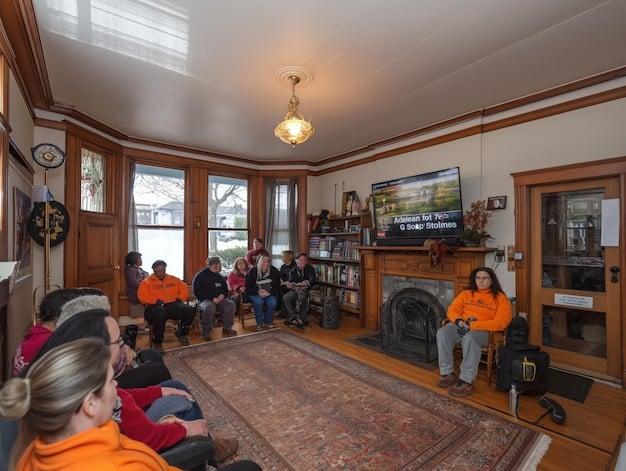Community impact on political campaigns in the US

The impact of community voices on political campaigns demonstrates how local issues and concerns increasingly shape national elections, influencing policy debates and candidate platforms in the US.
The influence of community voices on political campaigns is becoming increasingly significant. Local issues are no longer confined to municipal halls; they’re shaping national elections and influencing policy debates across the US.
Understanding community voices in US elections
Community voices are essential to the political landscape, particularly in the US, where local concerns frequently mirror or influence national trends. These voices encompass a wide range of perspectives, experiences, and issues that directly affect people’s everyday lives.
Political campaigns need to recognize and address these community voices to effectively connect with voters. Understanding how local issues influence national elections is crucial for any candidate looking to build broad support and enact meaningful policy changes.
Defining ‘community voices’
Within the context of political campaigns, ‘community voices’ refers to the collective opinions, concerns, and priorities of people residing in a specific geographic area or sharing a common interest. These voices emerge from local interactions and experiences, reflecting the diverse array of issues that affect residents’ lives.
Understanding these nuances is vital for crafting effective political strategies and achieving policy outcomes that reflect the desires and needs of the populace.
- Identifying key stakeholders and opinion leaders.
- Conducting thorough research to understand local priorities.
- Creating platforms for open dialogue and consultation.

The rise of local issues in national debates
There’s a noticeable shift in the political arena as local issues increasingly command attention on a national scale. No longer peripheral concerns, these issues form a key component of the national conversation, influencing policy debates and political strategies.
Understanding this trend is vital for politicians and citizens alike, as it underscores the interconnectedness of community-level dynamics and broader political movements.
Economic concerns and job creation
Local economic issues, such as unemployment rates, small business growth, and access to affordable housing, have transcended geographic boundaries, impacting national policy debates. Concerns about job creation and economic vitality are universal themes that resonate with citizens across the political spectrum.
Candidates who effectively address these issues with actionable plans and tangible solutions often gain significant traction during election cycles.
- Investing in infrastructure projects to stimulate job growth.
- Providing tax incentives for small businesses.
- Promoting workforce development programs tailored to regional needs.

How technology amplifies community voices
In the digital era, technology plays a pivotal role in amplifying community voices and facilitating political participation. Social media, online forums, and digital platforms provide avenues for individuals and groups to express their opinions, share information, and mobilize support for local issues.
Recognizing the transformative power of technology, political campaigns are increasingly leveraging digital strategies to engage with voters, disseminate information, and foster dialogue on local concerns.
Social media as a political tool
Social media platforms have emerged as indispensable tools for political engagement, allowing candidates and campaigns to reach voters directly, bypass traditional media gatekeepers, and cultivate online communities. Through strategic use of social media, political actors can amplify their messages, respond to voter concerns, and mobilize grassroots support.
Furthermore, social media enables citizens to share their thoughts, organize events, and hold elected officials accountable for their actions.
- Developing targeted social media campaigns to address local concerns.
- Utilizing social media to mobilize volunteers and organize community events.
- Monitoring social media sentiment to gauge public opinion and identify emerging issues.
Case studies: community-led campaigns
Examining successful community-led campaigns can offer valuable insights into the strategies and tactics that drive political change. These campaigns often demonstrate the ability of grassroots movements to shape policy debates, mobilize voters, and influence election outcomes.
By studying these case studies, campaigners can gain a deeper understanding of how community voices can be effectively harnessed to advance political agendas and achieve tangible results.
Environmental activism in rural communities
Rural communities facing environmental threats, such as pollution from industrial facilities, have increasingly turned to grassroots activism to defend their way of life. These campaigns often involve local residents organizing protests, launching legal challenges, and advocating for stricter environmental regulations.
By mobilizing community support and raising awareness of local environmental issues, these campaigns have succeeded in holding corporations accountable and influencing policy decisions.
Healthcare access in urban neighborhoods
Urban neighborhoods grappling with issues of healthcare access and affordability have also witnessed the emergence of community-led campaigns to advocate for improved healthcare services. These campaigns often involve community organizers, healthcare professionals, and patients working together to expand access to clinics, increase insurance coverage, and address health disparities.
Through community education, advocacy efforts, and partnerships with local healthcare providers, these campaigns have achieved significant advancements in improving healthcare access for vulnerable populations.
Challenges and criticisms of community-driven politics
Despite the potential benefits of community-driven politics, there exist challenges and criticisms that warrant careful consideration. Issues such as representation gaps, echo chambers, and the potential for manipulation can undermine the effectiveness and legitimacy of community engagement in political processes.
Acknowledging these challenges is crucial for promoting inclusivity, transparency, and accountability in community-driven political initiatives.
Ensuring inclusivity and representation
One of the key challenges of community-driven politics is ensuring that all voices are heard and represented, especially those of marginalized or underrepresented groups. If certain segments of the community are excluded from decision-making processes, the resulting policies may not reflect the needs and priorities of the entire population.
Efforts to promote inclusivity and representation require proactive outreach, inclusive dialogue, and mechanisms for addressing power imbalances within communities.
Avoiding echo chambers and polarization
Another concern is the potential for community-driven politics to reinforce echo chambers and exacerbate political polarization. When individuals primarily interact with like-minded peers and engage in limited cross-ideological dialogue, they may become entrenched in their views and resistant to alternative perspectives.
Creating opportunities for constructive dialogue, fostering critical thinking skills, and promoting media literacy can help mitigate the risks of echo chambers and polarization within communities.
Strategies for Effective engagement
To effectively engage with community voices in political campaigns, candidates and organizers need to adopt strategies that prioritize authenticity, transparency, and two-way communication. Building trust, establishing meaningful relationships, and demonstrating a genuine commitment to addressing local concerns are essential for fostering community support and achieving positive outcomes.
By embracing these strategies, political campaigns can leverage the power of community voices to drive meaningful change and build stronger, more inclusive societies.
Building trust with community members
Trust is the foundation of any successful effort to engage with community voices. Candidates and organizers must actively work to build trust by demonstrating integrity, transparency, and a sincere interest in understanding and addressing community concerns.
This may involve participating in community events, meeting with local leaders, and engaging in open dialogue about issues that matter most to residents.
Creating platforms for dialogue
Providing platforms for open and inclusive dialogue is essential for allowing community members to voice their opinions, share their experiences, and contribute to decision-making processes. Town hall meetings, community forums, and online discussion boards can serve as valuable venues for facilitating dialogue and fostering collaboration.
By creating spaces for meaningful dialogue, political campaigns can demonstrate their commitment to listening to and learning from community voices.
| Key Point | Brief Description |
|---|---|
| 🗣️ Community Voices | Opinions and priorities of local residents. |
| 🌐 Technology Impact | Amplifies community voices through social media. |
| 🤝 Community-led Campaigns | Drive change on local issues. |
| 🛡️ Strategies for Engagement | Prioritize authenticity and transparency. |
Frequently Asked Questions
▼
Community voices refer to the collective opinions, concerns, and priorities of people within a specific geographic area or sharing common interests, impacting local and national political issues.
▼
Local issues often resonate nationally, shaping policy debates and candidate platforms. They engage voters by addressing their direct concerns, making them more likely to participate in elections.
▼
Technology, especially social media, allows communities to share their views widely, organize, and directly engage with political campaigns, thus increasing their influence.
▼
Challenges include ensuring inclusivity, avoiding echo chambers, and managing the risk of manipulation. It is important to represent all community segments fairly.
▼
By building trust, creating platforms for dialogue, and showing genuine commitment to addressing local concerns, campaigns can connect effectively with community voices.
Conclusion
In conclusion, the impact of community voices on political campaigns is undeniable. As local issues increasingly influence national elections, candidates and campaigns must prioritize engaging with communities in an authentic and meaningful way. By embracing strategies that foster trust, promote dialogue, and address local concerns, political actors can build stronger, more inclusive societies and achieve positive outcomes for all.





